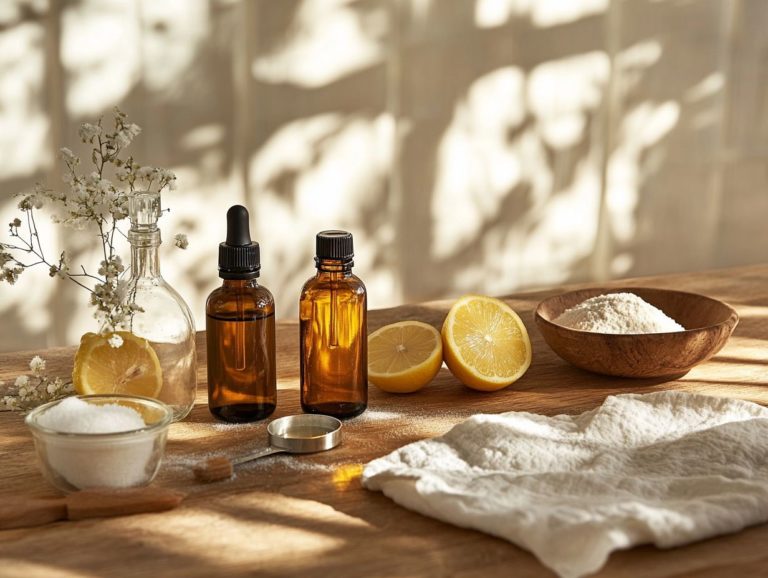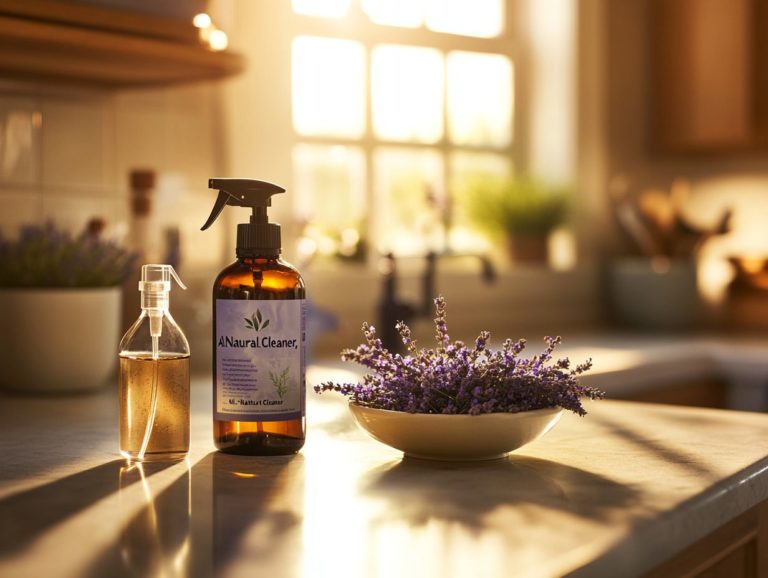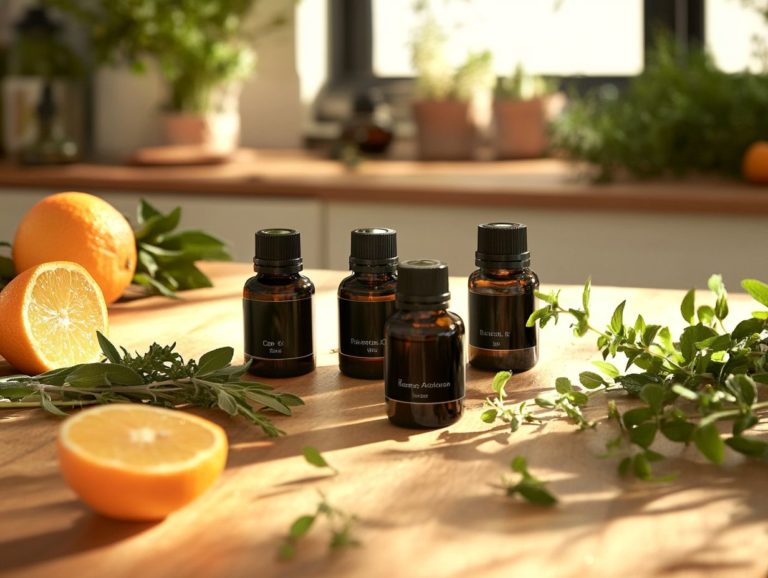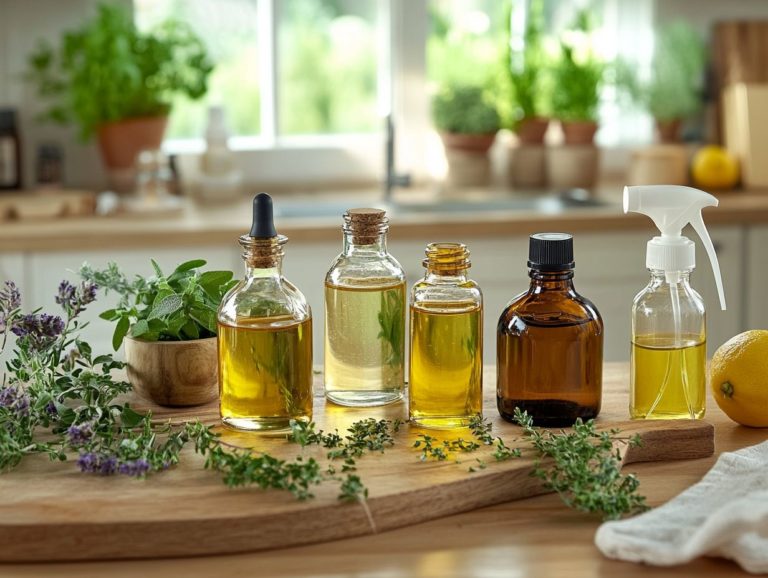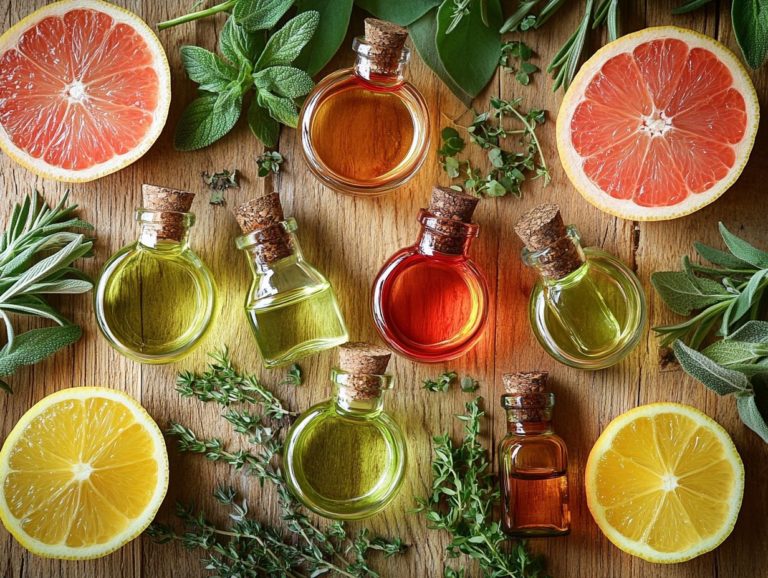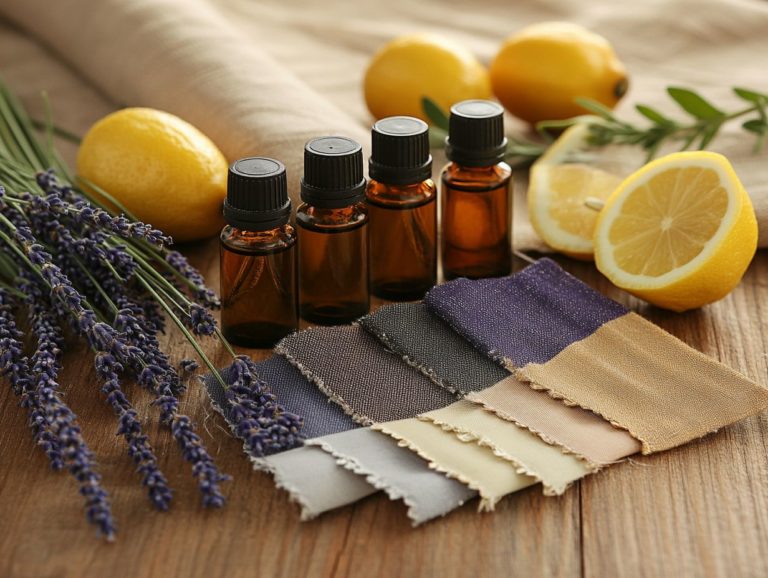Essential Oil Cleaning Myths Debunked
Essential oils have recently gained immense popularity as natural cleaning alternatives, yet this surge has brought with it a plethora of misconceptions and essential oil myths.
You might assume that these aromatic oils are universally safe and effective for every cleaning task. However, understanding the truth behind prevalent myths such as their antibacterial properties, effectiveness, and compatibility with homes that have pets, children, and individuals with specific health conditions is essential.
Get ready to explore the myths and discover the amazing benefits of using essential oils for cleaning! We will guide you on how to use them safely and offer practical applications that can elevate your cleaning routine while considering essential oil safety and effectiveness.
Contents
- Key Takeaways:
- What Are the Common Myths About Using Essential Oils for Cleaning?
- What Are the Benefits of Using Essential Oils for Cleaning?
- How Can Essential Oils Be Used for Cleaning?
- What Are Some Safety Precautions When Using Essential Oils for Cleaning?
- Frequently Asked Questions
- What are common myths about essential oils for cleaning?
- Can essential oils replace traditional cleaning products?
- Can I mix different essential oils together to enhance their cleaning properties?
- Do all essential oils have antibacterial properties?
- Can essential oils be harmful to pets or children?
- Do I need to use a lot of essential oils for them to be effective in cleaning?
Key Takeaways:
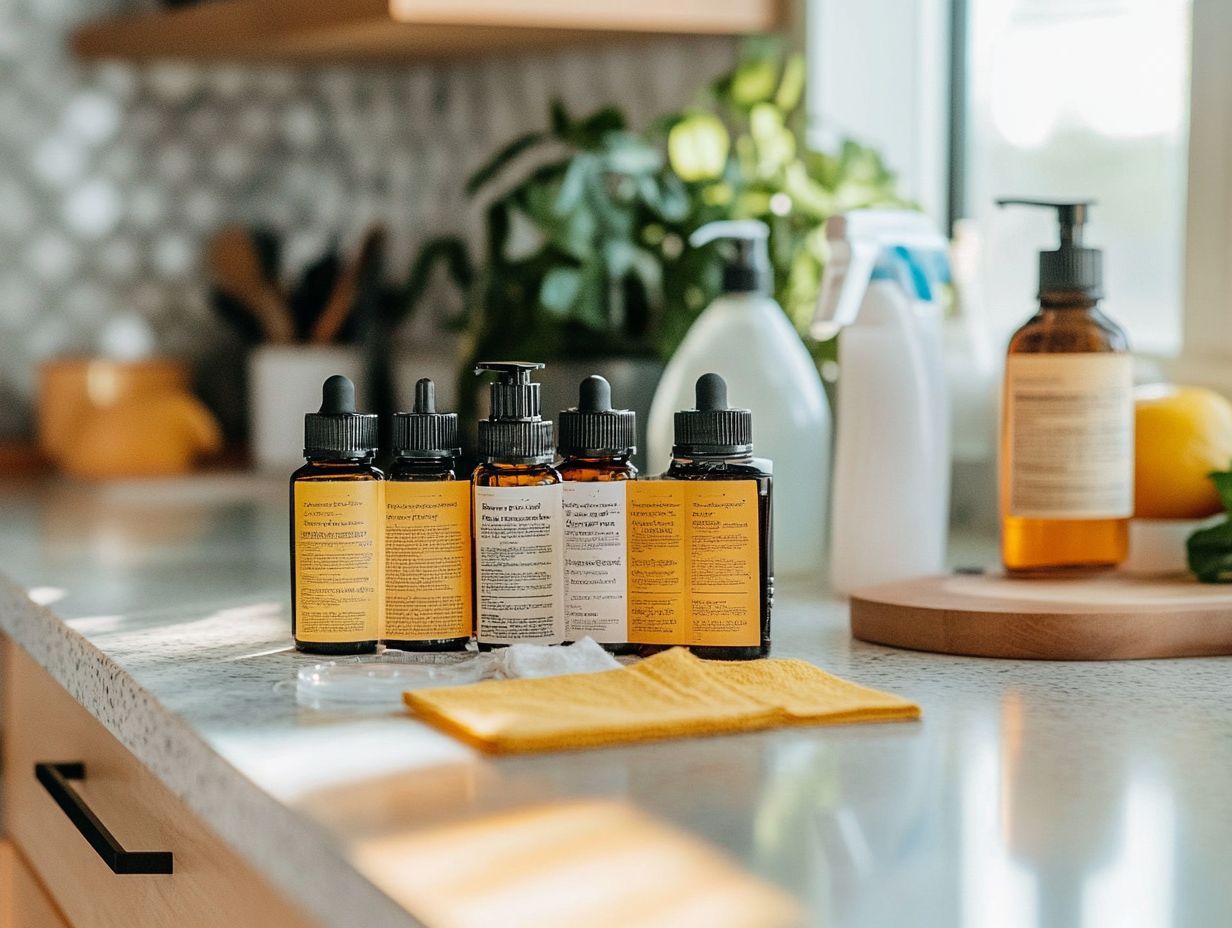
- Think essential oils are safe? Think again! Here s the truth you need to know: Essential oils may not be as safe for cleaning as commonly believed.
- Essential oils have numerous benefits for cleaning, including natural fragrance, the ability to kill germs and bacteria, and the avoidance of toxic ingredients.
- Essential oils can be used in various cleaning products, but proper precautions should be taken to ensure safe usage, especially around pets and children.
What Are the Common Myths About Using Essential Oils for Cleaning?
In the realm of wellness, essential oils have garnered considerable acclaim for their diverse applications, including cleaning. However, several prevalent essential oil misconceptions continue to circulate, potentially misleading consumers about their safety and efficacy.
Many individuals operate under the assumption that, since essential oils are sourced from plants, they are universally safe for all cleaning purposes. This misconception can lead to serious problems, including allergic reactions, immune response issues, or skin irritations, particularly if appropriate precautions are overlooked.
Understanding these myths is essential for making informed decisions within the essential oil community and fostering greater consumer awareness about the essential oil market and its offerings.
Myth 1: Essential Oils are Natural, so They Must be Safe for Cleaning
One of the most widespread myths you might encounter is the belief that essential oils, being natural substances, are entirely safe for cleaning without any precautions.
While it’s true that these oils are derived from plants, the term ‘natural’ doesn t automatically equate to safety. You may find that some individuals experience allergic reactions when exposed to certain oils, leading to skin irritation, sensory disturbances, or respiratory issues.
Quality control is paramount, as not all essential oils are created equal; the purity and concentration can differ greatly between brands. The chemical components in these oils might interact unfavorably with existing health conditions, complicating their use for both cleaning and wellness purposes.
It’s crucial to approach their use with informed caution, considering potential adverse reactions and ensuring proper quality control.
Myth 2: Essential Oils Can Replace All Other Cleaning Products
Another prevalent myth is that essential oils can completely take the place of traditional cleaning products, leading many to believe they are a one-size-fits-all solution for home care, including personal care.
While essential oils do provide a host of benefits, including natural antibacterial properties, delightful fragrances, and a way to lessen the use of harsh chemicals, they truly shine as a complementary tool in your cleaning arsenal. For example, tea tree oil and lemon oil can work wonders in disinfecting surfaces when properly diluted, making them fantastic additions to your homemade cleaners.
However, when faced with heavy-duty grime or stubborn stains, sometimes you need to pull out the conventional cleaning agents for those optimal results.
By understanding when to incorporate essential oils, especially in their diluted forms, you can adopt a balanced approach that elevates your cleaning routine while keeping chemical exposure to a minimum.
Myth 3: Essential Oils Have the Ability to Fight Bacteria
Believing that all essential oils have the ability to fight bacteria can lead you astray. The reality is that not every essential oil offers the same therapeutic benefits or chemical compositions necessary to effectively target bacteria.
Take tea tree, eucalyptus, and thyme oils, for example. These oils exhibit significant antibacterial activity, thanks to their high concentrations of powerful natural compounds like terpinen-4-ol and thymol. On the flip side, you have lavender and chamomile oils, which might not pack the same antibacterial punch. Their constituents, including linalool and bisabolol, are more aligned with soothing effects than with battling bacteria and are often used in aromatherapy.
The method of essential oil extraction plays a crucial role in shaping the oil’s chemical profile. For instance, steam distillation tends to preserve more of the volatile compounds, which can amplify the antibacterial properties. Other extraction methods might alter the composition and diminish efficacy.
By grasping these nuances, you can make informed choices about the essential oils that best suit your intended uses.
Myth 4: Essential Oils are Safe for Pets and Children
Many people assume that essential oils are perfectly safe for use around pets and children, but this common misconception can lead to unwanted reactions if not approached with care.
When you introduce these fragrant substances into a home with vulnerable individuals, it s essential to understand that certain essential oils like tea tree, peppermint, and eucalyptus can pose significant risks. These oils can trigger symptoms that range from mild irritation to severe allergic reactions in both pets and children. To ensure their safety, it’s wise to dilute essential oils properly before applying them and to perform a patch test, which involves applying a small amount of the diluted oil on a small area of skin to check for any adverse reactions.
Avoid diffusing oils in enclosed spaces where pets and young children spend their time, as they may be particularly sensitive to respiratory issues. Ultimately, adopting a cautious approach not only helps you steer clear of unpleasant surprises but also keeps your family safe and healthy.
What Are the Benefits of Using Essential Oils for Cleaning?
Transform your cleaning routine today! Incorporating essential oils into your cleaning regimen presents an array of benefits that resonate with both natural safety and a heightened sensory experience, transforming your home care practices.
The potent properties of these oils not only infuse your space with delightful, natural fragrances but also ensure that your cleaning endeavors remain free from harsh chemicals and toxins.
Many essential oils are renowned for their antimicrobial capabilities, effectively tackling germs and bacteria without resorting to harmful ingredients. Their eco-friendly nature is increasingly appealing to consumers who are in search of chemical-free alternatives, all while contributing to a broader wellness lifestyle.
1. Natural Fragrance
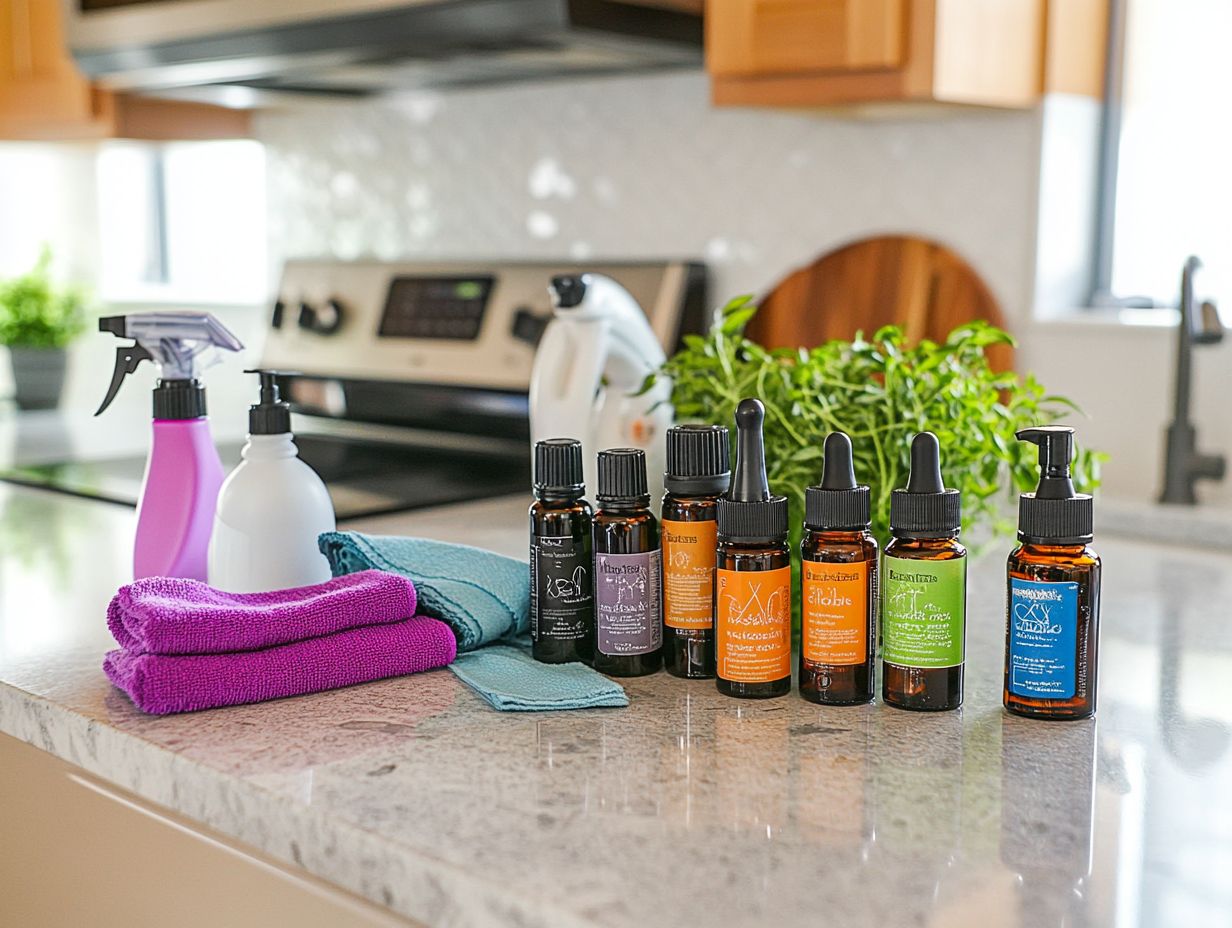
One of the standout advantages of using essential oils for cleaning lies in their remarkable ability to infuse any space with a natural fragrance that elevates the atmosphere. This transformation not only makes your environment more inviting but also enhances your overall sense of well-being.
Take lavender, for instance. Its calming and relaxing aroma makes it an ideal choice for bedrooms or any area where tranquility is paramount. Conversely, citrus oils like lemon and orange can invigorate kitchens and living rooms, filling them with uplifting scents that energize the space. Understanding the botanical name of each essential oil can help in identifying its specific therapeutic effects.
You can also experiment with combining different oils to create unique fragrance blends. For example, mixing eucalyptus and peppermint can deliver a refreshing boost while imparting a sense of clarity that clears the mind.
The versatility of essential oils in crafting delightful fragrances not only brightens your surroundings but also transforms the act of cleaning into a genuinely enjoyable experience.
2. Non-Toxic and Chemical-Free
Essential oils are a fantastic alternative for non-toxic and chemical-free cleaning. They’re perfect for health-conscious individuals.
By embracing these natural remedies, you can significantly reduce your exposure to harmful toxins often lurking in traditional cleaning products. This helps you nurture a healthier living environment.
Essential oils not only boast antibacterial and antiviral properties from their potent plant derivatives but also infuse your spaces with a fresh and invigorating aroma without relying on synthetic fragrances. Using carrier oils helps in the proper dilution and application of essential oils, ensuring safe usage and avoiding potential skin irritations.
Understanding that not all essential oils are created equal is vital for effective cleaning outcomes. Familiarizing yourself with essential oil sourcing, labels, and dilution practices allows you to unlock their full potential while safeguarding your health and well-being.
3. Antimicrobial Properties
Essential oils have antimicrobial properties that effectively eliminate germs. Oils like tea tree, lavender, and eucalyptus stand out for their antibacterial and antifungal abilities.
These oils have been thoroughly vetted in the essential oil industry for their therapeutic effects. You can easily incorporate them into your cleaning practices by adding just a few drops to your homemade cleaners or by diluting them in water and vinegar solutions.
Consider the unique composition of each essential oil, including their chemical components. For example, tea tree oil has a robust scent that may require careful mixing to prevent overwhelming your space with strong odors.
Ensuring essential oil safety is paramount; always test for allergic reactions and ventilate the area well when using these oils. Understanding plant metabolism gives you insights into the various plant compounds present in these oils.
The therapeutic effects of these essential oils not only create a cleaner environment but also cultivate a calming atmosphere, transforming your cleaning experience into something enjoyable and beneficial for your holistic health.
4. Environmentally Friendly
Using essential oils for cleaning is a powerful statement about your commitment to the environment. These natural oils come without the toxic footprint of conventional cleaners.
This natural origin lightens the chemical load released into your surroundings. It also offers a biodegradable option that significantly reduces pollution and eliminates toxic ingredients.
With the increasing focus on sustainable practices, it s no wonder many are opting for essential oils to align their cleaning routines with eco-friendly values.
These oils often come in eco-friendly packaging that helps reduce waste, effectively addressing the waste issues that plague traditional cleaning products. This aligns with growing consumer awareness regarding environmental footprints.
By embracing these aromatic extracts, you enhance your indoor air quality while replacing harmful ingredients with a mindful alternative. This smart choice makes a big difference toward a greener planet and highlights your commitment to natural safety, showcasing your dedication to a healthier environment.
How Can Essential Oils Be Used for Cleaning?
Essential oils can be utilized in a myriad of ways for cleaning. They provide versatility and effectiveness when integrated into your daily routines.
Whether you’re crafting surface cleaners or creating refreshing air fresheners, the possibilities are abundant. These oils also work well in personal care products, offering a holistic approach to cleanliness.
This allows you to select products that resonate with your health and wellness goals while effectively tackling dirt and germs. By understanding the various methods of using essential oils, you can fully harness their benefits and foster a cleaner and healthier home environment.
1. Surface Cleaners
Creating surface cleaners with essential oils is an elegant and effective approach to harnessing their cleansing properties. Plus, they infuse your home with a refreshing scent.
These natural cleaners do more than eliminate germs and bacteria; they release delightful aromas that elevate your mood and enhance any room’s atmosphere. Consider using tea tree, lavender, and lemon oil for their exceptional antibacterial and antifungal qualities.
Remember, it’s important to use diluted oils when formulating these cleaners. This not only optimizes their effectiveness but also ensures your safety during application. Overly concentrated oils can irritate the skin or provoke adverse reactions, so adhere to proper dilution guidelines.
2. Air Fresheners
Essential oils can effortlessly transform into natural air fresheners. They offer delightful fragrances while effectively neutralizing odors without harmful chemicals.
Explore various methods to create your customized sprays, candles, or diffuser blends that cater to your unique preferences. For example, combining lavender and lemon in a spray bottle filled with water achieves a refreshing scent and promotes relaxation.
Diffusers are another excellent option; they disperse the oils into the air, helping to create a balanced atmosphere. When selecting oils, consider those that align with the effects you desire. For energizing spaces, citrus scents work wonders, while woody oils like cedarwood foster a calming environment.
To keep your home smelling fresh, regularly clean your diffusers and avoid blending too many scents that might clash.
3. Laundry Detergent
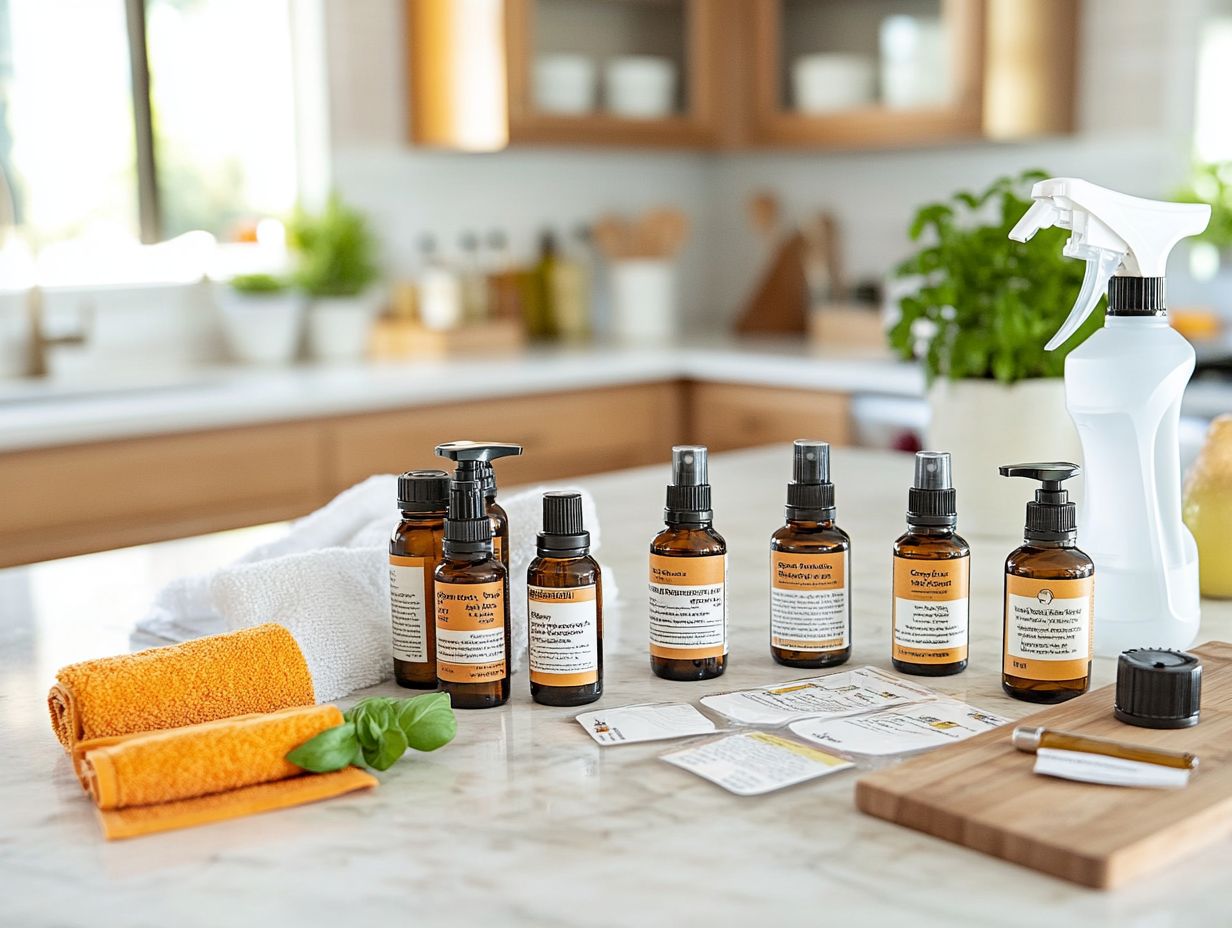
Incorporating essential oils into your laundry detergent provides a non-toxic and fragrant alternative for cleaning your clothes. These natural extracts envelop your garments in delightful scents while boasting antibacterial and antifungal properties.
Popular choices such as lavender, eucalyptus, and tea tree oil are celebrated for their refreshing aromas and disinfecting abilities. To seamlessly integrate essential oils into your laundry routine, mix a few drops with your regular detergent before washing, or use a dedicated essential oil diffuser designed for laundry purposes.
It’s vital to consider the fabric type to prevent any damage. Ensure that the oils you choose are pure and free of additives for both safety and optimal performance. Always check the botanical name and other quality control measures to guarantee the essential oil purity.
4. Dish Soap
Utilizing essential oils in your dish soap elevates the cleaning experience and leaves your dishes smelling fresh and inviting.
By choosing a natural blend, you can significantly reduce your exposure to harsh chemicals commonly found in traditional dish soaps. This provides a safer option for your family and the environment.
When crafting your homemade dish soap, select essential oils with antibacterial properties and delightful fragrances, such as tea tree, lemon, or lavender. These oils fight germs and enhance the overall sensory experience of dishwashing.
Feel free to experiment with different combinations to uncover unique scents that ensure effectiveness. Transform your dishwashing routine into a delightful and enjoyable experience.
Try making your own cleaning products with essential oils today!
What Are Some Safety Precautions When Using Essential Oils for Cleaning?
While essential oils provide a wealth of benefits for cleaning, it s vital to observe safety precautions to prevent adverse reactions and ensure their effective use.
Given the potential for skin irritation and allergic reactions, understanding safe usage and proper dilution is essential when incorporating essential oils into your cleaning routines. Being informed about essential oil misconceptions can help mitigate risks.
By adhering to recommended guidelines, you can enjoy the advantages of essential oils while minimizing associated risks.
1. Dilute Properly
One of the most crucial safety precautions is to dilute essential oils properly before application. This step is vital to avoid skin irritation and allergic reactions.
Understanding how to mix essential oils with a carrier oil can greatly enhance both the safety and effectiveness of these powerful oils. For general use on adults, a common dilution is 2-3%, which typically involves combining about 12-18 drops of essential oil with 1 ounce of a carrier oil, such as coconut or jojoba.
When using oils with children, take a more cautious approach with a 1% dilution, translating to around 5-6 drops per ounce. This careful approach aligns with essential oil safety guidelines and helps prevent adverse reactions.
Always make it a practice to test the diluted oil on a small patch of skin, like your forearm, to check for any adverse reactions before applying it more liberally. This simple yet vital step can ensure a safe and enjoyable experience with essential oils.
2. Avoid Contact with Eyes and Skin
Direct contact with your eyes and skin can cause irritation and discomfort, so it s important to take precautions when working with essential oils.
To ensure your safety, wear protective gear like gloves and goggles, especially when handling highly concentrated oils. Maintaining a clean workspace is also crucial to prevent any accidental spills that could lead to unintended exposure.
Storing essential oils correctly is key to keeping them safe and effective! They should be kept in dark glass bottles and stored in a cool, dry place away from direct sunlight. This practice not only preserves their potency but also reduces the risk of accidental contact, creating a safer environment for everyone.
3. Keep Out of Reach of Children and Pets
To ensure the safety of your children and pets, it s essential to keep essential oils out of their reach. Ingestion or inappropriate exposure can lead to serious reactions, so taking proactive measures is key.
Prioritize creating a secure storage environment by utilizing high cabinets or locked boxes specifically designed for housing these potent substances. Always use child-proof containers to prevent accidents!
It s crucial to educate yourself about the specific oils that can harm pets, so be extra cautious with your selections. For instance, oils like tea tree, eucalyptus, cinnamon, and clove are known to be toxic to dogs and cats. Even a small amount can result in symptoms ranging from lethargy to gastrointestinal distress.
These instances highlight the importance of essential oil information and essential oil safety. It s imperative to remain vigilant and store these essential oil products wisely to keep your household safe from toxic ingredients and ensure natural safety.
Share your essential oil safety tips with friends and family to spread the word!
4. Do Not Ingest
It’s best not to ingest essential oils. Doing so can cause serious health issues.
Ingesting essential oils can pose significant risks and is generally ill-advised. It may lead to serious health complications, including allergic reactions and adverse effects.
The potent compounds in these oils can irritate your digestive system and may trigger toxic reactions in some instances. If you have pre-existing health conditions or are taking specific medications, the risks can be even greater.
These oils contain chemical compounds that can have strong effects. Instead of considering ingestion, think of these concentrated extracts as your allies in aromatherapy and household cleaning. For example, adding a few drops to a diffuser creates a serene atmosphere and uplifts your mood. Combining oils like tea tree or lemon with water makes for effective cleaning solutions.
Always remember to dilute essential oils with a carrier oil when applying them topically to avoid skin irritation and other potential reactions.
Frequently Asked Questions
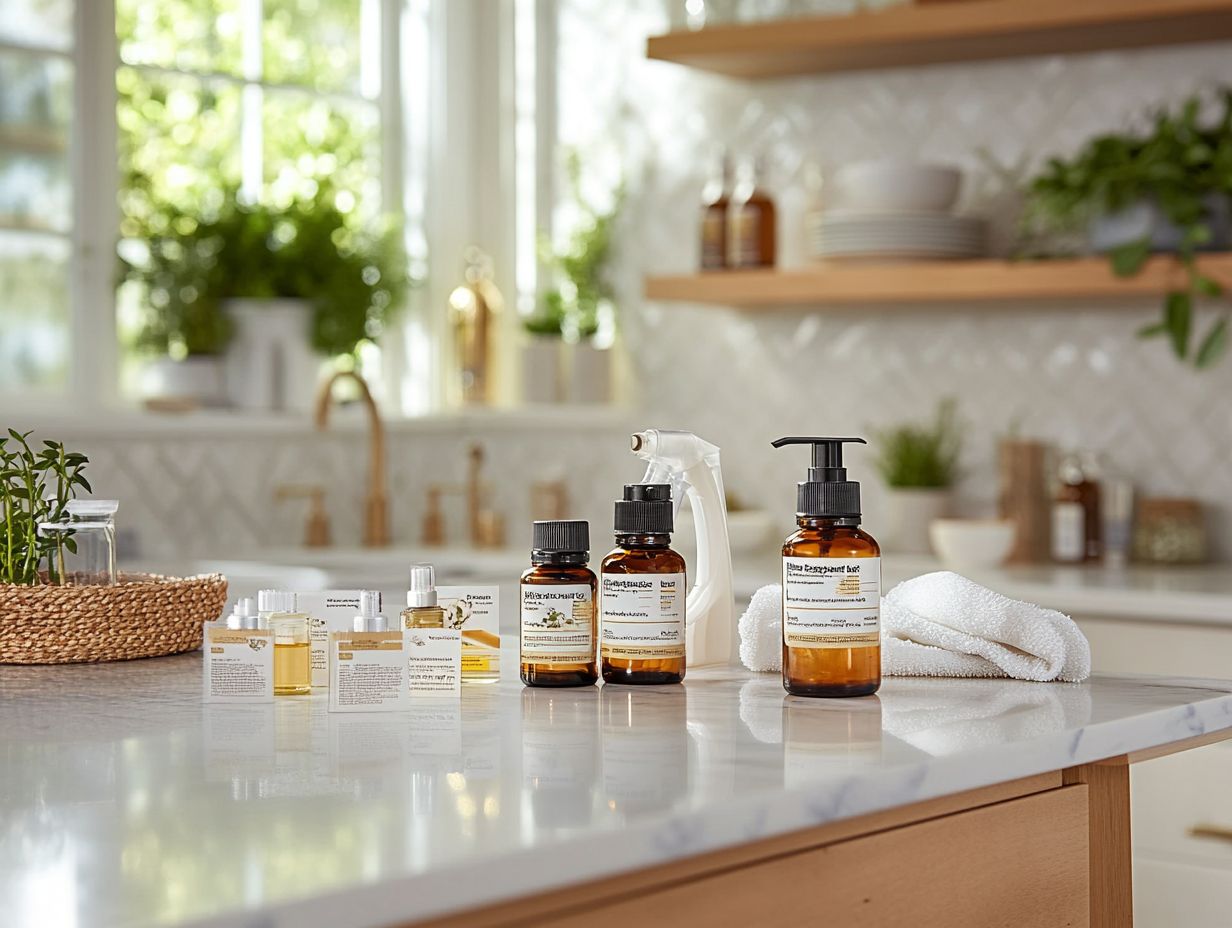
What are common myths about essential oils for cleaning?
Common myths often arise from misunderstandings within the essential oil community.
Some common myths include that essential oils are not effective, are expensive, or can damage surfaces. These myths often stem from a lack of consumer awareness and proper information.
Can essential oils replace traditional cleaning products?
Within the essential oil industry, there is a growing trend towards using pure and chemical-free oils for cleaning purposes.
While essential oils can be used as a natural alternative to traditional cleaning products, they may not be as effective against certain germs and bacteria. Always follow cleaning guidelines to ensure a clean and sanitary home!
Can I mix different essential oils together to enhance their cleaning properties?
Mixing different essential oils involves understanding plant metabolism and the secondary metabolites in each oil.
Yes, certain combinations can enhance their cleaning power. For example, mixing lemon and tea tree essential oils creates a powerful disinfectant. Research proper dilution ratios and potential reactions before creating your own blends.
Do all essential oils have antibacterial properties?
It’s a common misconception that all essential oils are antibacterial; the therapeutic effects vary widely.
No, not all essential oils have antibacterial properties. Some may have antiviral or antifungal properties. Always check the botanical name and labels to verify their specific properties.
Can essential oils be harmful to pets or children?
The essential oil market provides various products, but safe usage is crucial to prevent adverse reactions.
Yes, certain essential oils can be toxic to pets and children if ingested or used improperly. Keep essential oils out of reach and always dilute them properly before use. Remember, diluted oils are safer and still provide benefits without overconcentration!
Do I need to use a lot of essential oils for them to be effective in cleaning?
Using essential oils effectively ties into the broader concept of holistic health and wellness.
No, a little goes a long way! Using too much essential oil can be wasteful and potentially harmful. Follow recommended dilution ratios for safe and effective use. Quality control in the essential oil industry ensures that even small amounts are potent and effective.

